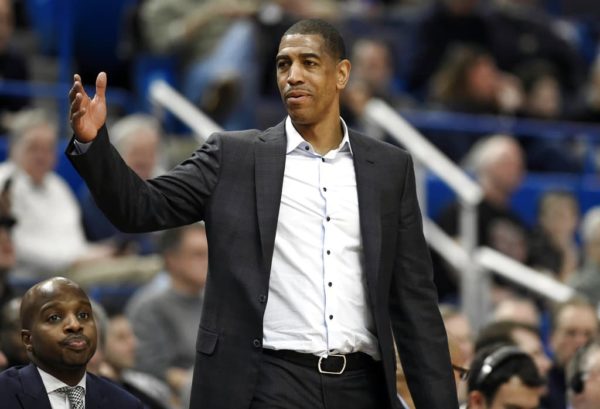HARTFORD, Conn. (AP) — The University of Connecticut asked a judge Friday to dismiss a complaint filed by former basketball coach Kevin Ollie, who contends his firing was in part racially motivated.
The school argues that the federal court doesn’t have jurisdiction and Ollie doesn’t make a specific claim under federal law in his complaint, which was filed this month.

File-This Feb. 15, 2018, file photo shows Connecticut head coach Kevin Ollie during the first half an NCAA college basketball game, in Hartford, Conn. The University of Connecticut is asking a federal judge to dismiss a complaint filed by former coach Ollie, who claims his firing was in part racially motivated.
(AP Photo/Jessica Hill, File)
UConn also says the former coach’s lawyer never notified the school that he planned to bring the complaint despite a conference call between the sides minutes before the motion was filed. The school’s lawyers described that as an “apparent attempt to deprive the university of the opportunity to be heard.”
Both sides made oral arguments Friday and U.S. District Court Judge Kari Dooley set another hearing for Jan. 25.
UConn fired Ollie in March after a 14-18 season, citing NCAA violations. The school said because the firing was “for cause” it did not have to pay the coach about $10 million left on his contract. Ollie filed an internal grievance seeking that money and the case is now headed to arbitration.
Ollie, who is black, argues in his complaint, he was treated differently from former coach Jim Calhoun, who is white. Calhoun wasn’t fired after being penalized for recruiting violations.
Ollie also contends the university has illegally tried to deter him from pursuing a state or federal racial discrimination case.
The school’s collective bargaining agreement with the union that represents Ollie states that UConn is not obligated to follow its internal grievance process, which includes arbitration, if the employee “seeks to resolve the matter in any other forum, whether administrative or judicial.”
Ollie’s attorneys want the judge to order the school to continue arbitration even if he pursues a complaint with the state’s Commission on Human Rights and Opportunities or the federal Equal Employment Opportunity Commission.
The school says the argument is moot because it has never indicated it would end arbitration if he pursued a discrimination complaint and he has yet to file such a complaint.


